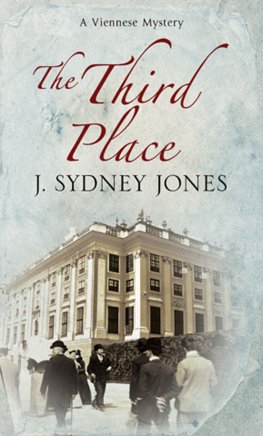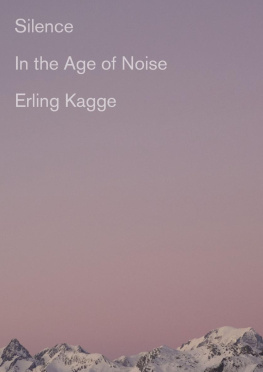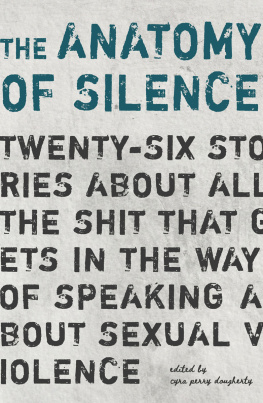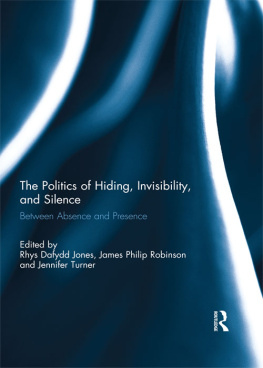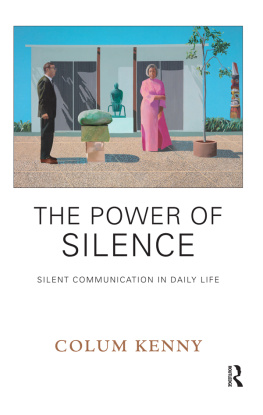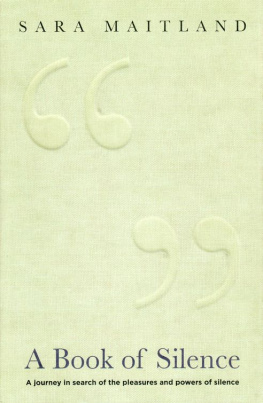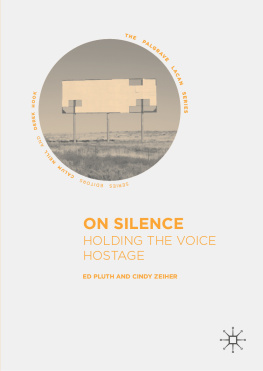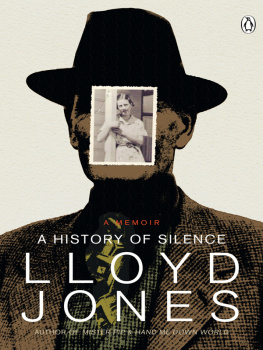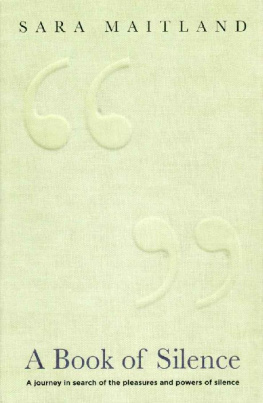J. Jones - The Silence
Here you can read online J. Jones - The Silence full text of the book (entire story) in english for free. Download pdf and epub, get meaning, cover and reviews about this ebook. genre: Detective and thriller. Description of the work, (preface) as well as reviews are available. Best literature library LitArk.com created for fans of good reading and offers a wide selection of genres:
Romance novel
Science fiction
Adventure
Detective
Science
History
Home and family
Prose
Art
Politics
Computer
Non-fiction
Religion
Business
Children
Humor
Choose a favorite category and find really read worthwhile books. Enjoy immersion in the world of imagination, feel the emotions of the characters or learn something new for yourself, make an fascinating discovery.
- Book:The Silence
- Author:
- Genre:
- Rating:4 / 5
- Favourites:Add to favourites
- Your mark:
- 80
- 1
- 2
- 3
- 4
- 5
The Silence: summary, description and annotation
We offer to read an annotation, description, summary or preface (depends on what the author of the book "The Silence" wrote himself). If you haven't found the necessary information about the book — write in the comments, we will try to find it.
The Silence — read online for free the complete book (whole text) full work
Below is the text of the book, divided by pages. System saving the place of the last page read, allows you to conveniently read the book "The Silence" online for free, without having to search again every time where you left off. Put a bookmark, and you can go to the page where you finished reading at any time.
Font size:
Interval:
Bookmark:
J. Sydney Jones
The Silence
Whereof one cannot speak, thereof one must be silent.
Ludwig Wittgenstein, Tractatus Logico-PhilosophicusOne
A lone figure stood high up in the central spire of Viennas Rathaus. At the observation window above the enormous illuminated clock, he surveyed the city he ruled, feeling the juddering thud of each minutes passing in the mechanism beneath his feet.
For a time, he watched the docile Viennese plod about their business this brutally cold afternoon of the last day of January. The skies were clear, brittle blue, and afforded a view to the northwest of the Vienna Woods, flecked in snow.
Slowly, menacingly, he allowed his eyes to move to the far left middle distance. There stood the twin towers of the Votivkirche, which he regarded as an open insult to him. This was the devotional church to the emperor, Franz Josef, built to commemorate the occasion when the young emperor survived an assassins knife.
Doktor Karl Lueger, mayor of Vienna for three years, and something of a king himself, scowled as he gazed at the emperors church. He and Franz Josef were old enemies; thrice had the Habsburg denied Lueger his place as mayor, even after the Viennese had resoundingly elected him. Three times Franz Josef had felt it his solemn duty to save the Viennese from themselves.
The old fool had the effrontery to call me a demagogue, Lueger thought. Me, a man of the people who simply takes to heart the plight of the little man and the true Christian in this mongrelized empire.
He made an audible snort.
Is everything all right, sir?
Kulowski, Luegers beefy bodyguard, looked expectantly up at him from the bottom of the last flight of stairs.
Lueger shook his head dismissively at the man.
Of course everything is not all right, you dolt, he wanted to say. As long as there is a Habsburg left in Vienna, things will never be right.
Soon, however, very soon, things would be set right.
As he was accustomed to doing, he threw open the observation window on the tower, breathing in the crisp air. He could smell the scent of black pine and the sweetness of snow. Beneath, on the Ringstrasse, a solitary D streetcar, pulled by a dappled mare, was making its way to Schottentor. A new motorcar suddenly passed it, causing the horse a sudden fright, but the skilled tram driver soon brought the animal under control.
Another tradition: Lueger gathered a gob of saliva in his mouth and spat in the direction of the Votivkirche.
It would fall to earth as a snowflake, he thought.
Then he closed the observation window.
The world was changing. Here we are in the first year of the twentieth century. Motorcars will be the future of transport. The city is growing at an astounding rate; soon it will finger off into the hills of the sacrosanct Vienna Woods.
Now, as the day began to dim, electric streetlights along the Ringstrasse flickered on. Away with gas lighting and horse-drawn equipages all remnants of an old and tired world. Even the holy shrine of the Vienna Woods could not stop the steady thrum of progress.
Lueger, at fifty-five, felt himself very much a part of the new century, not the old one. He did not wax nostalgic over that which might be lost with modernization, unlike the stodgy emperor who refused even to ride in a motorcar and intensely disliked the telephone.
Your five oclock appointment, Kulowski called up the stairs to him.
Damn the man, Lueger thought. Still, it would not do to keep the ward boss of the Third District waiting too long.
Coming, he said.
He no longer carried himself with the same bounce as of old. Mentally he felt younger than ever, and his face was still as handsome as when he was a young man. Thanks to his good looks, he had mobilized the Gretl brigade, or the Amazons, as people called his ardent female supporters. Though these women did not have the vote, they idolized him and in turn enlisted their husbands and male relatives. They still remained his most ardent followers, dubbing him Handsome Karl.
Physically, however, Lueger was beginning to suffer the outward signs of diabetes and nephritis. His illness was still a closely guarded secret, but he doubted it could remain so for long. Climbing the three hundred and thirty-one steps up to the top of the Rathaus was no longer an easy task for him; as a result, he restricted these visits to once weekly. It was worth the effort: to view the world beneath him like this, his personal fiefdom.
And before long he would not have to share it with his old nemesis, Franz Josef.
He was smiling so broadly when he reached Kulowski, that the bodyguard wondered what the mayor was up to. It was the grin of an imp, of a man scheming and damned pleased with himself.
Nice view? Kulowski said.
But Lueger ignored him, gripping the handrail as he continued descending.
Going down was worse than going up; perhaps he would have an electric lift installed? After all, he could put the expense down to advocating tourism. Not that he would allow the hoi polloi to ride his elevator, but it would make a fine excuse for funding from the City Council.
Lueger took his mind off the descent by going over the points he would need to cover in his upcoming meeting. His backers in the Third District were getting restless. And by backers he did not mean the Marias and Josephs with their tiny corner Lebensmittel or Backerei who thought they were the mayors special cause. No. His real backers were the landlords who had put millions into his campaigns and were still waiting for some results for their money.
They had reached the bottom of the spire stairs, contiguous with the upper floor of offices, when they heard the shot. Not a military man, still Lueger knew for a certainty it was a gunshot.
So did his bodyguard. Kulowski attempted to grab him from behind and throw him to the parquet of the corridor to protect him.
Lueger resisted, however. Leave it, for Jesus sake, he bellowed. Theyre not firing at me.
Kulowski looked at the mayor quizzically for a moment before he realized the shot was, in fact, nowhere near them. Footsteps were pounding along the corridors, followed by excited voices. They followed the throng of people to the southwest corner office.
They could now see that the crush of city workers and other councilmen had gathered at Councilman Reinhold Steinwitzs door; a hush such as at a funeral had fallen over them.
Lueger looked to the crowd of people and then beyond; Kulowski followed his gaze. When the bodyguard looked back to the mayor, Lueger wore a shrewd grin on his face.
The architect Otto Wagner, who had reached the office first and halted at the entrance, aghast at what he saw, now pushed his way back through the crowd. There was the harsh smell of cordite in the air, and Oberbaurat Wagner, despite being nattily attired in his frock coat, was not looking very professorial, Lueger thought. His eyes were wide and there was a nervous urgency about the man that the mayor, who had employed him on municipal projects from regulating the Danube Canal to building the metropolitan railway, the Stadtbahn, had never before seen.
Finally Wagner saw Lueger and rushed to his side.
Mayor. Its your friend, Councilman Steinwitz. I think hes killed himself.
Two
Despite snow flurries that kept most people indoors or on public transport, Advokat Karl Werthen walked to work the morning of February 5, 1900, a daily ritual he tried not to deviate from.
The Habsburgergasse in Viennas First District was as void of human activity as if it had been a Sunday and not a Monday. As he approached his office at number four, Werthen could see the profiles of the supporting columns decorating the first-story facade. One of the naked Atlases bore an unfortunate protuberance of snow at just below waist level. These sculptures were a comfort to Werthen; a solid and reassuring presence in the midst of what some days felt to be pure chaos. He did not want to leave this particular Atlas in such disgrace.
Font size:
Interval:
Bookmark:
Similar books «The Silence»
Look at similar books to The Silence. We have selected literature similar in name and meaning in the hope of providing readers with more options to find new, interesting, not yet read works.
Discussion, reviews of the book The Silence and just readers' own opinions. Leave your comments, write what you think about the work, its meaning or the main characters. Specify what exactly you liked and what you didn't like, and why you think so.


